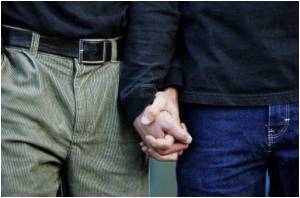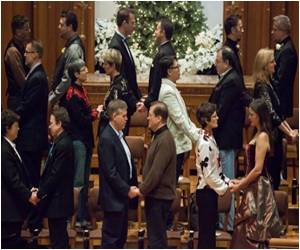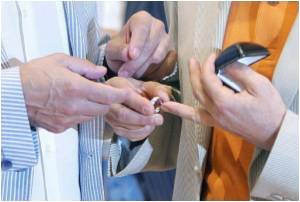The gay pride marchers with banners demanding marriage equality in Japan did not escape the notice of Boris Dittrich, who was in Tokyo for the city's first Rainbow Week.

"The world has gotten so much smaller," the former Dutch lawmaker and gay rights activist told AFP. "When things happen in one part of the world, people (in other parts) get inspired."
Twelve years after the Netherlands broke the long-held norm that only a man and a woman can vow to love and cherish each other "till death do us part," support for same-sex marriage is gaining global momentum.
In April, three countries -- Uruguay, New Zealand and France -- recognized gay marriage, bringing the total to 14 nations in North and South America, Europe, Africa and the Asia-Pacific region.
That's in addition to 10 states and the US capital Washington, where a landmark ruling from the Supreme Court on same-sex marriage is due by the end of June, as well as parts of Mexico and Brazil.
"It's like in the movies, when someone stands up in the crowd ... and then another and another," said Renato Sabbadini, co-secretary of the International Lesbian, Gay, Bisexual, Trans and Intersex Association in Brussels.
"It feels very rapid, even for me as someone who's in it," added Rea Carey, executive director of the National Gay and Lesbian Task Force in New York. "But it's been decades in the making."
The trend however is by no means universal.
In some 75 countries, including most of Africa and the Middle East, homosexuality remains a crime -- and decriminalization, not marriage, is the number-one objective for LGBT campaigners.
Nigeria, for instance, is considering a law that would imprison any gays who dare marry, while Colombia's senate is blocking a constitutional court ruling that would allow same-sex couples to marry from June.
"We are seeing (the issue of same-sex marriage) being used as a bludgeon in places where it is not a goal," said Roberta Sklar of the International Gay and Lesbian Human Rights Commission in New York.
In places that do have marriage equality, several factors paved the way.
"The world has become urbanized, and that's a major factor in knocking down traditional norms," said demographer Joseph Chamie, who's been monitoring same-sex marriage from a global perspective for years.
That in turn has prompted a rethink of what marriage means, said Chamie, co-author with Barry Mirkin in 2011 of the first major study of same-sex marriage as a global phenomenon.
Another factor is a growing acceptance of sexual minorities in mass media and popular culture, as seen just last week when basketball player Jason Collins became the first US professional athlete to "come out".
Then there's the simple fact that more and more people personally know someone -- a friend, a colleague, a family member -- who can freely identify themselves as gay, lesbian or transsexual.
"When visible people allow you to frame issues not in abstract terms, but in very concrete terms, then most of the population is much more advanced and willing to concede that (LGBT) people have equal rights," Sabbadini said.
Local factors come into play as well.
In Spain, Argentina and Uruguay, where memories of dictatorship remain fresh, recognition of same-sex marriage has unfolded in the wider context of human rights and democratization -- trumping resistance from the Roman Catholic Church, which still lists homosexuality as a sin.
And in the United States, "gay marriage became an issue because marriage matters as a status symbol more in the US than in other wealthy countries," said Johns Hopkins University sociologist Andrew Cherlin.
"Perhaps what we are seeing is the resurrection of the importance of marriage led by those who have been unable to marry until now," added Cherlin, who studies the state of marriage and the American family.
Looking forward, Chamie expects marriage equality to become the norm throughout the European Union as its member states, bound together in a common market, feel pressure to align their marriage laws.
In the United States, Carey sees a few more states hopping on the bandwagon if, as LGBT activists and their allies hope, the Supreme Court rules on the side of same-sex marriage.
The danger, she said, is that wider acceptance of marriage equality will mask other serious concerns.
Thirty-one US states define marriage in their constitutions in strict heterosexual terms -- and there is no federal law that clearly prevents an employer from firing a worker for being gay, married or not.
Source-AFP
 MEDINDIA
MEDINDIA




 Email
Email







